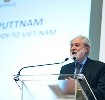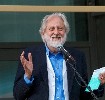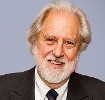Attacking the Devil: Britain's greatest newspaper campaign
“It was a story told in a way that made the heart beat faster and brought a tear to the eye,” said James Harding, the BBC’s head of news, immediately after the London premiere of Attacking the Devil: Harold Evans and the last Nazi war crime.
He was addressing a packed audience on Wednesday evening that included many victims of thalidomide, the drug given to pregnant women in the late 1950s and early 1960s to combat morning sickness.
Those women, their husbands and their offspring were at the centre of a documentary film that paid tribute to Evans’s long struggle on their behalf.
He and his team of Sunday Times reporters sought to gain proper compensation from Distillers, the company that produced and marketed the pill that caused thousands of women to give birth to damaged babies.
I’ve seen many excellent feature films based on real cases of investigative journalism, such as All The President’s Men, Kill The Messenger and Spotlight, but Attacking the Devil, by sticking strictly to the facts and making a virtue of having witnesses speak directly to the camera, outshines them all.
In so doing, the film-makers, brother and sister David and Jacqui Morris, managed to tell a complicated story that unfolded over the best part of 50 years in such a way that it was both easy to understand and shocking to contemplate.
Evans was the star turn. It illustrated his initial commitment, while editor of the Darlington-based Northern Echo, to campaigning journalism.
Once he got to the Sunday Times, in 1967, he found himself with a large and skilled editorial staff who, provided with a target, took aim at Distillers.
He and his team, who included Phillip Knightley, Elaine Potter, Bruce Page, Godfrey Hodgson and Marjorie Wallace, dared to tread where other editors had feared to go.
They just wanted to tell the truth and dedicated themselves to a campaign that went on for years. The main struggle proved to be a legal one. Trial by trial, the film records the lengthy, tortuous and expensive fight to achieve justice in the face of an implacable foe and a compliant government.
For some in the audience, including several journalists I spoke to afterwards, the Nazi link was a complete surprise, despite it having first emerged in 2009.
It was then that Martin Johnson, director of the Thalidomide Trust, discovered documents which revealed that thalidomide had been developed by the Nazis and tested on prisoners at concentration camps.
It was created by a scientist, Otto Ambros, as an antidote to Sarin, a toxic nerve agent used as a chemical weapon that Ambros had, with four other men, previously discovered.
Johnson told the Sunday Times at the time of his revelation: “It is now appearing increasingly likely that thalidomide was the last war crime of the Nazis.” Hence the secondary title of the film.
Chemie Grünenthal, the German firm that developed and sold thalidomide, denies this claim. But it is surely significant that Ambros worked for the company following his release from jail in 1952 after his conviction at Nuremberg for testing chemicals on concentration camp inmates.
It is also the case, as the final moments of the film make clear, that the fight for compensation for thalidomide victims continues.
In Spain, for example, victims won a court victory against Grünenthal in November 2013 only to see it overturned on appeal a year later on the grounds they had sued too late. Evans, writing about the matter in the Guardian, noted:
“One of Grünenthal’s undoubted victims, Juan Carlos Vélez, 44, sits on the pavement in a smart part of Madrid with a hat upturned for coins. He can’t hold out a hand because he hasn’t any.”
With such stories in mind, and so many of the victims in front of him – people whose names and intimate stories he knows so well – it was no surprise that Evans shed a tear on stage at Picturehouse Central.
After being treated to a standing ovation at the conclusion of the screening he sought to get a message across about journalism: lethargy is its enemy; curiosity is its inspiration.
At 87, Evans remains as curious as ever. Lethargy is not in his lexicon. There were many veteran journalists in the audience but it would have been better still to have seen students of journalism.
Instead they should ensure that they see Attacking the Devil, which goes on general release on 22 January.













